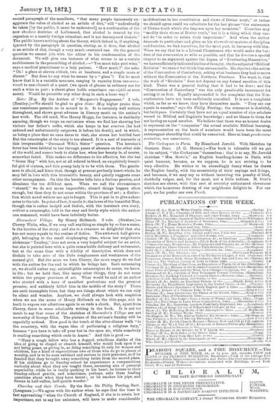Churches and their Creeds. By the Rev. Sir Philip Perring,
Bart. (Longman.)—We agree with the author when he says that the time is
fast approaching "when the Church of England, if she is to retain her importance, not to say her existence, will have to make considerable
modifications in her constitution and views of Divine truth," or rather we should agree could we substitute for the last phrase "the statements of Divine truth which she imposes upon her members." Churches may "modify their views of Divine truth," but it is a thing which they can- not do "in order to retain their importance." And when the author descends to particulars and gives us his views about matters of discipline and doctrine, we find ourselves, for the most part, in harmony with him. When we say that he is a Liberal Churchman who would make the bor- ders of the communion as wide as possible, and that he devotes a special chapter to an argument against the dogma of "Everlasting Damnation," we have sufficiently indicated his line of thought. On the subjectof "Biblical Revision" we cannot but think him unreasonable. He objects to the action of the Convocation of Canterbury, asking what business they had to move without the Convocation of the Northern Province. The truth is, that the work of "Revision" does not depend on any formal sanction of this kind. There was a general feeling that it had to be done; and the "Convocation of Canterbury" was the only practicable instrument for setting it on foot. Equally ungrounded is the complaint that the Non- conformists have not been sufficiently consulted. It is not a complaint which, as far as we know, they have themselves made. "They are our equals in number," says Sir Philip Perring; the statement is doubtful, butlet it pass. Certainly they have not an equal number of ripe scholars versed in Biblical and linguistic knowledge ; and no blame to them for not having an equal number. We believe that there was an honest desire to represent on the "companies" the actual available Biblical learning. A representation on the basis of numbers would have been the most extravagant absurdity that could be conceived. Hero at least ponderantur sententiae, non numerantur.


































 Previous page
Previous page